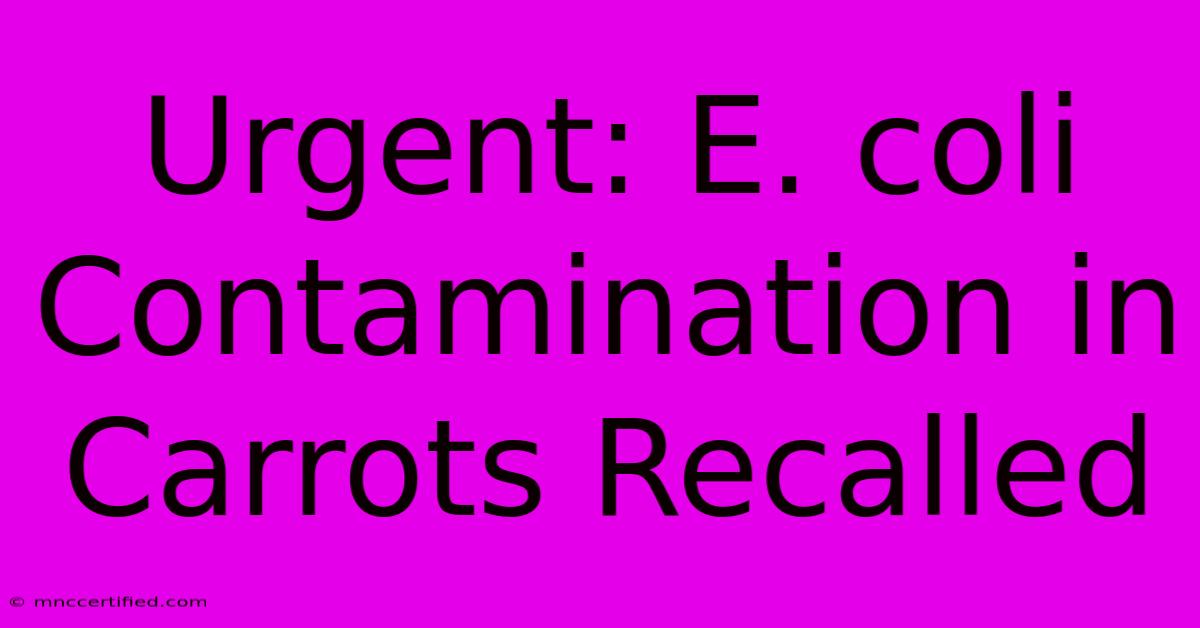Urgent: E. Coli Contamination In Carrots Recalled

Table of Contents
Urgent: E. coli Contamination in Carrots Recalled – What You Need to Know
E. coli contamination in food products is a serious public health concern. Recently, a significant recall has been issued for carrots due to potential contamination with E. coli bacteria. This article provides crucial information about this recall, its implications, and steps you can take to protect yourself and your family.
Understanding the E. coli Recall
Several brands of carrots have been recalled due to suspected contamination with Escherichia coli (E. coli) O157:H7. This specific strain of E. coli is particularly dangerous, capable of causing severe illness, including hemolytic uremic syndrome (HUS), a potentially life-threatening condition affecting the kidneys.
Key details you should be aware of:
- Affected Brands: [Insert specific brand names and product details here. This information will need to be updated regularly as the recall situation evolves. Link to the official recall notice from the relevant food safety authority.]
- Product Codes: [Insert specific product codes, lot numbers, and best-by dates. Again, this requires up-to-date information from official sources.]
- Distribution: [Specify the geographic regions where the affected products were distributed.]
Why is this recall urgent? E. coli O157:H7 can cause symptoms such as severe stomach cramps, diarrhea (often bloody), vomiting, and fever. These symptoms typically appear within 2-8 days of consuming contaminated food. While most people recover within a week, some individuals, especially young children, older adults, and people with weakened immune systems, are at higher risk of developing serious complications like HUS.
What to Do if You Have Recalled Carrots
If you have purchased any of the recalled carrot products, do not eat them. Immediately discard the carrots in a sealed bag or container to prevent cross-contamination.
Steps to Take:
- Check your refrigerator: Carefully examine your refrigerator for any carrots matching the description of the recalled products.
- Dispose of safely: Double bag the recalled carrots and dispose of them in the trash.
- Clean thoroughly: Wash your hands thoroughly with soap and water after handling the recalled carrots. Also, disinfect any surfaces that may have come into contact with them.
- Monitor your health: If you have consumed any of the recalled carrots and experience any symptoms of E. coli infection, seek immediate medical attention.
Preventing E. coli Contamination in the Future
While this recall highlights the importance of food safety, there are several steps you can take to minimize the risk of E. coli contamination in the future:
- Wash your produce: Always thoroughly wash all fruits and vegetables, including carrots, under running water before eating or preparing them. Scrub firm produce with a brush.
- Cook thoroughly: Cook ground beef and other meats to the recommended internal temperature to kill E. coli bacteria.
- Practice good hygiene: Wash your hands frequently, especially after handling raw meat and before preparing food.
- Separate raw and cooked foods: Keep raw meat and poultry separate from ready-to-eat foods to prevent cross-contamination.
Stay Updated on the Recall
This situation is dynamic, and information may change rapidly. For the most up-to-date information on the recalled carrots, regularly check the websites of your local food safety authority [link to relevant authority website] and the Centers for Disease Control and Prevention (CDC) [link to CDC website].
This article provides important information regarding the carrot recall. Remember to always prioritize food safety and seek medical attention if you experience any symptoms of food poisoning. Staying informed is critical in protecting your health and the health of your family. Regularly check official sources for updates.

Thank you for visiting our website wich cover about Urgent: E. Coli Contamination In Carrots Recalled. We hope the information provided has been useful to you. Feel free to contact us if you have any questions or need further assistance. See you next time and dont miss to bookmark.
Featured Posts
-
Nfl Giants Replace Jones With De Vito
Nov 19, 2024
-
Dot Physical Covered By Insurance
Nov 19, 2024
-
Sidemen Wembley Charity Match Tickets Gone
Nov 19, 2024
-
Deviated Septum Covered Insurance
Nov 19, 2024
-
Australia Vs Pakistan 3rd T20 I Live Score
Nov 19, 2024